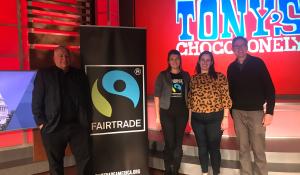
From product labels to marketing tactics, there are many commonly used sustainability buzzwords that can quickly become hard to decipher.
When determining where to spend your money, it can be easy to get lost in the cloud of common sustainability-related terms. Using claims that sound good but are tough to verify is a common marketing tactic to create a sustainable appearance, a.k.a., greenwashing. Vague claims are often accompanied by idyllic images, such as a pristine lake or fresh flowers, which lull people into a sense of eco-friendliness, even if the pictures have nothing to do with how a laundry detergent or snack is made.
The Federal Trade Commission (FTC) plays a very limited role in cracking down on greenwashing, so savvy consumers can become more familiar with popular buzzwords to see past the haze. Knowledge is one more tool in your kit for distinguishing true green from greenwashing.
Biodegradable or Compostable
Biodegradable materials can naturally decompose with help from bacteria and small organisms. Biodegradability is great but can also cause problems: Chemically treated items like wood and paper products can become toxic in the process of being broken down.
Instead of buying items that are just labeled as biodegradable, look for Biodegradable Products Institute (BPI) certifications—this is a verified third-party mark of true biodegradability.
Compostable items break down over time into soil or fertilizer—but this isn’t true all the time. Without the necessary conditions, even if something is theoretically compostable it can still take hundreds of years to decompose in other environments like landfills or oceans. Many items marked as compostable are only compostable in industrial composting facilities (like “compostable” bioplastics), not in home compost bins (which can handle things like eggshells and coffee grounds).
If you have access to industrial composting, such as through your city’s pickup system, make sure you’re only putting items in there that are truly compostable. If you don’t have a composting service, swap items like supposedly “compostable” paper plates with versions that can be washed and reused, instead.
Carbon-Neutral
Carbon neutrality does not mean emissions-free, but rather that a company is reducing its emissions until it gets to the point where its emissions output is equal to its emissions reductions. Until it reaches that goal, it may be buying carbon offsets to make up the difference.
While carbon offsets are better than ignoring the problem, they don’t always result in forward momentum in battling the climate crisis—they simply claim to cancel out damage that’s already happening or done. Greenwashing in carbon offsets can complicate things further—for example, many carbon offset projects are based on planting trees that may or may not ever be planted.
While a plan for carbon neutrality is still more than many companies are doing, net-zero emissions is the next step further, which accounts for all greenhouse gas emissions from a company, not just carbon. Even fewer companies are taking on carbon negativity, which means decreasing emissions and offsetting more than what they produce.
While we wait for carbon negativity to become the standard, carbon-neutral and net-zero commitments should be investigated and celebrated if found to be genuine. Start by looking on a company’s website for programs with immediate effects, such as renewable energy and community projects, and verification of carbon offsets.
Reading reports from credible, non-partisan news sources can also help. The University of Massachusetts Amherst’s Top 100 Polluter indexes can provide more context for how company emissions rank, as well as acquainting yourself with carbon emission scopes—a classification system to label a company’s greenhouse gas emissions.
Eco-Friendly or Sustainable
Eco-friendly and sustainable may seem broad—because they are. At their core, both mean something that is good for the planet and not environmentally harmful. However, since neither term is regulated, they can lead to gray areas or straight-up greenwashing. The key to getting to the bottom of eco-friendly or sustainable claims is determining what exactly makes the product eco-friendly. Instead of taking the words at face value, investigate the packaging, website, or social media to look for sustainability pages and victories. A company practicing true green will gladly define the reasoning behind its use of the term.
Luckily, there are many certifications that are trustworthy when looking for products that are truly eco-friendly and sustainable. Green America’s Green Business Network certification covers businesses across 30+ industries. Other labels to look for that have third-party verification are Green Business Network, USDA Organic, Leaping Bunny, B-Corp, Environmental Working Group, Green Guard, GOTS, and Fair Trade Certified. Each industry, such as food or textiles, has its own certifications, so do your research as you buy and look into labels you see.
Ethical
Finding a product labeled as “ethical” sounds great, but the term actually doesn’t tell you much at all. Claiming that a product is ethical is a very convenient way for companies to avoid detailing their practices and backing up their green appearance. Reading the word ethical is an instant signal to pull out the magnifying glass and investigate the company further.
Finding a fair trade certification on the product’s label or website is a great sign. Fair Trade America and Fair for Life are trustworthy certifications representing that the company has been assessed as devoting time and resources to their economic, social, and environmental impacts in various ways that come together to create an ethically produced product. From respecting and empowering workers to climate action and transparency, Fair Trade companies represent a company certified in ethical behavior.
Fairtrade certifications aren’t the only way to think about or verify ethical behavior. A company that works in good faith with employee unions and doesn’t fight unionization, and has sustainability and worker rights reports on its website are also good tells that the company is interested in fair treatment of people.
When traversing the jungle of sustainability speak, knowing the meaning behind buzzwords can help you confidently choose products. While it may take a little investigation, identifying greenwashing and moving towards your own true green is possible. Before long, you’ll find that your true green detective skills are unstoppable.
Green America and the certified Green Business Network members mentioned in this article, which meet or exceed Green America’s standards for social and environmental responsibility, are here to help.







